Women's Sports Week 2017: Niamh Briggs on the growth of women's rugby in Ireland
- Published
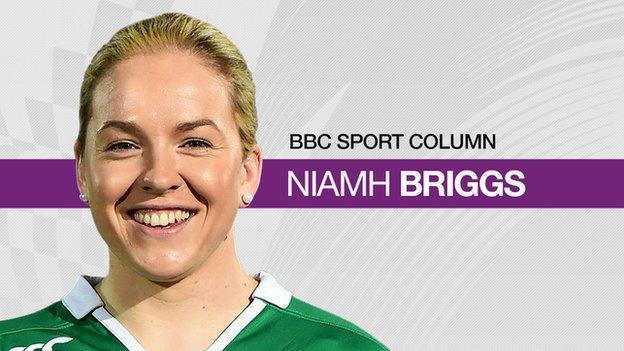
Full-back Niamh Briggs is the captain of the Ireland rugby union team. This year Ireland will host the World Cup and in this special column - written for Women's Sport Week 2017 - Niamh explains the challenges of preparing for the tournament as an amateur team, striking the right balance between work and sport and the importance of victory to the growth of the game.
The 2017 Women's Rugby Union World Cup takes place in August and it is a huge opportunity for the game in Ireland.
I can think back to many proud moments during my career - winning my first Ireland cap, the Grand Slam in 2013, beating New Zealand, my 50th cap, and beating Scotland on the final day of the Six Nations in 2015 to lift the trophy - but winning the World Cup would top it all.
With Ireland hosting the tournament, we want to show what we are made of - and we won't be settling for the semi-finals again, like we did in 2014.
'My job takes my mind off rugby'
I balance rugby with my full-time job for An Garda Síochána (the police force in Ireland).
Being a Garda was always something I wanted to do. I did not want to sit in an office all day; I wanted a job where I would be active and meet people.
In many ways, the qualities that attracted me to the Gardaí are similar to the things I appreciate most about playing sports.
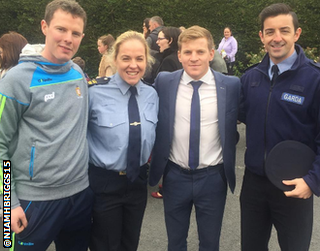
Niamh Briggs works full time for An Garda Síochána alongside her responsibilities as Ireland captain
And the job marries with sport very well - both rugby and the Gardaí have been great for me and I'm fortunate to have incredibly supportive and understanding bosses.
I'm able to train in the mornings for a few hours before work - and as someone who often over-thinks things, I find work helps distract from rugby. Likewise sport and training take my mind off work.
Finding the balance between training, games, and work can be tough and to manage you have to be willing to accept that you'll have little time for anything else.
I make personal sacrifices but I do it because I love it. Knowing that it cannot last forever is the hugely motivating factor.
'Some of the team have to train alone'
As an amateur side, the Ireland team is made up of players with a diverse range of jobs.
We have students, teachers and lecturers. Some work for the Irish Rugby Football Union (IRFU), while Claire Molloy is a doctor. This can make training tough.
We have week-long training camps a couple of times over the summer but outside of that train in regional centres.
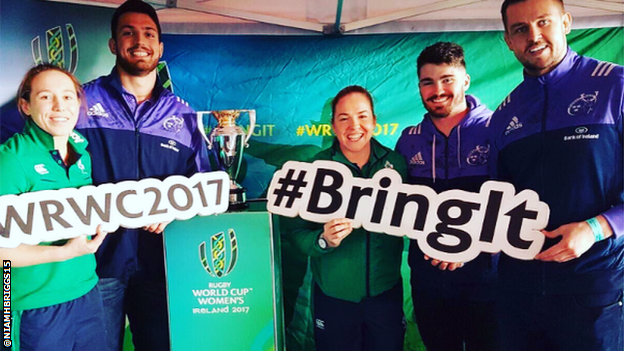
Ireland will host the 2017 Women's World Cup in August
I'm based in Limerick, so train at the University of Limerick (UL), where the Munster lads train, with a couple of other girls from the team, but we have regional centres in Cork, Galway, Belfast and Dublin. The majority of players can make it to one of those.
Unfortunately, a couple of the girls have to train on their own. Molloy, for example, lives and trains alone in Wales.
Finding the strength to train alone like that is phenomenal. It's extremely difficult to get the best out of yourself in sessions and sometimes, after work when you are tired, you are reliant on the ability of the people around you to push you through.
'The women's game is in its infancy'
I have always been incredibly sporty. I was quite a shy child growing up, and lacked in self-esteem, but sport gave me the opportunity to have another, more confident, persona.
My dad's job meant we moved around a bit. When I started a new school or was thrust into in a new area, sport was the way I settled in. It was a common language.
I'm now 32 but I didn't actually start playing rugby until I was 21. I was playing Gaelic football at a fairly high level when I was asked to take part in a tag tournament at my local rugby club. I won the player of the tournament prize.
In my small town - Dungarvan, in Waterford - women's sports teams would struggle for numbers. So when asked to join, I said: "I'll come and play rugby if you come and play Gaelic football." That's what teams had to do to survive at that stage.
Women's rugby itself in Ireland is still in its infancy. Professionalism isn't yet an option. There is still a lot of work to do building the domestic game's foundations before a professional women's league is sustainable.
The women's game only came under the umbrella of the IRFU in 2008 - and there are still big barriers that we have to overcome.
Some clubs still don't have girls' teams. We need to make every club accessible - that's really important. Once they're in, it's all about trying to keep them.
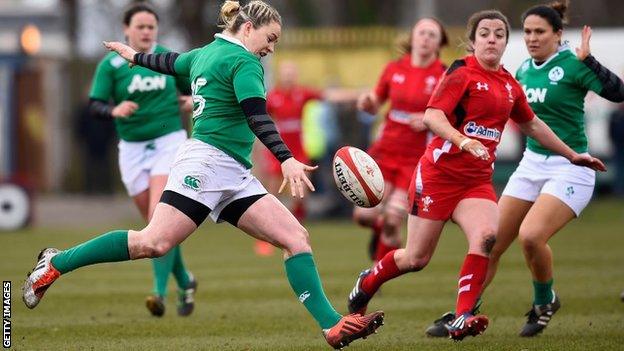
Briggs - playing here against Wales in 2015 - only started playing rugby when she was 21
Often we only have a couple of teams that are, say, under-15 or under-18 in close proximity to each other so they might not be able to play that many competitive games.
It's vital that we keep working to generate those pathways into the game for girls.
There's an onus on us all as women rugby players. We speak about it as a national team. You go out, you play, and you leave the jersey in a better place for the next person who puts it on - and that filters down to club and provincial level.
I don't like to use the term the term 'role model' but that's what we get called, and is how we have to act.
England and France provide excellent models for where women's rugby can go. They have huge numbers participating and that needs to be our ultimate aim.
A big part of growing the game comes as a consequence of our success as a team. We have reaped big benefits from our success in the Six Nations in recent years and reaching the semi-finals of the last World Cup.
Our 2014 victory over the All Blacks - who had not lost in the World Cup since 1991 - felt incredible. And if we can put in a good shift at this summer's World Cup on home soil and get the country behind the sport in the same way our New Zealand win did, that can only be good for the game. We have to take the opportunity to build a strong legacy.
Selection before captaincy
The prospect of captaining Ireland at a World Cup on home soil is very exciting. It would be a hugely proud moment for me and my family - but I have to get picked first!
I have been very fortunate to have a good bunch of senior girls in the team who are able to take on leadership roles when needed and we very much work together at it.
I learned a lot from Fiona Coghlan, and watched Brian Driscoll and Paul O'Connell, but ultimately it's about being comfortable in the role.
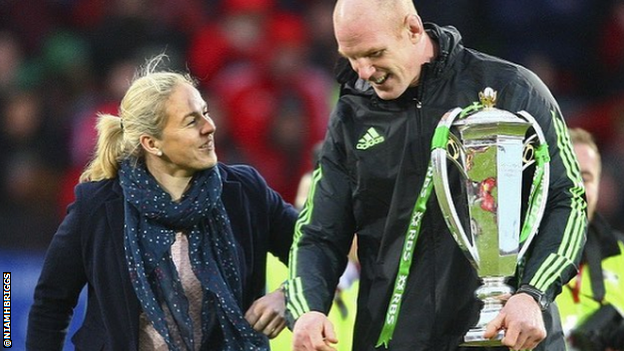
Niamh Briggs has tried to learn from the style of former Ireland captain Paul O'Connell
I've missed a lot of rugby this year. That takes its toll mentally. You will always worry about your place in a World Cup year but the support from staff and the team has been great. I have just been concentrating on getting myself back in, getting fit again, showing what I can do in training, and putting my hand up for selection.
I wouldn't like to be coach Tom Tierney having to select a squad of 28 for this World Cup. There are 48 training in the extended squad working really hard.
This breeds a lot of competition and that's what you want. If we are to do well, we need really good players who can stand up to the test of international competitions.
'The World Cup won't be easy but we want to win'
To be involved in a cross-border tournament in Ireland, external is a proud achievement for us.
Sport is powerful enough to make political divisions fade into the background, to the extent that being part of an all-Ireland team doesn't even figure in our consciousnesses as players.
We all want to play in games where the stakes are high and we want to play with the best.
The World Cup won't be a walk in the park. We have a tough group with France, Australia and Japan.
France beat us to third place last time round, Australia have some very strong sevens players coming back into their team, and Japan are putting huge resources into the sport before hosting the next men's World Cup.
In Ireland, there's been a huge shift towards women's sport generally and particularly women's rugby. The more our games are televised - and the more that people can see we're good athletes and good rugby players - the bigger that shift will be.
We want to win the World Cup and we're preparing to win it.
Niamh Briggs was speaking to Suzanne Wrack for BBC Sport.